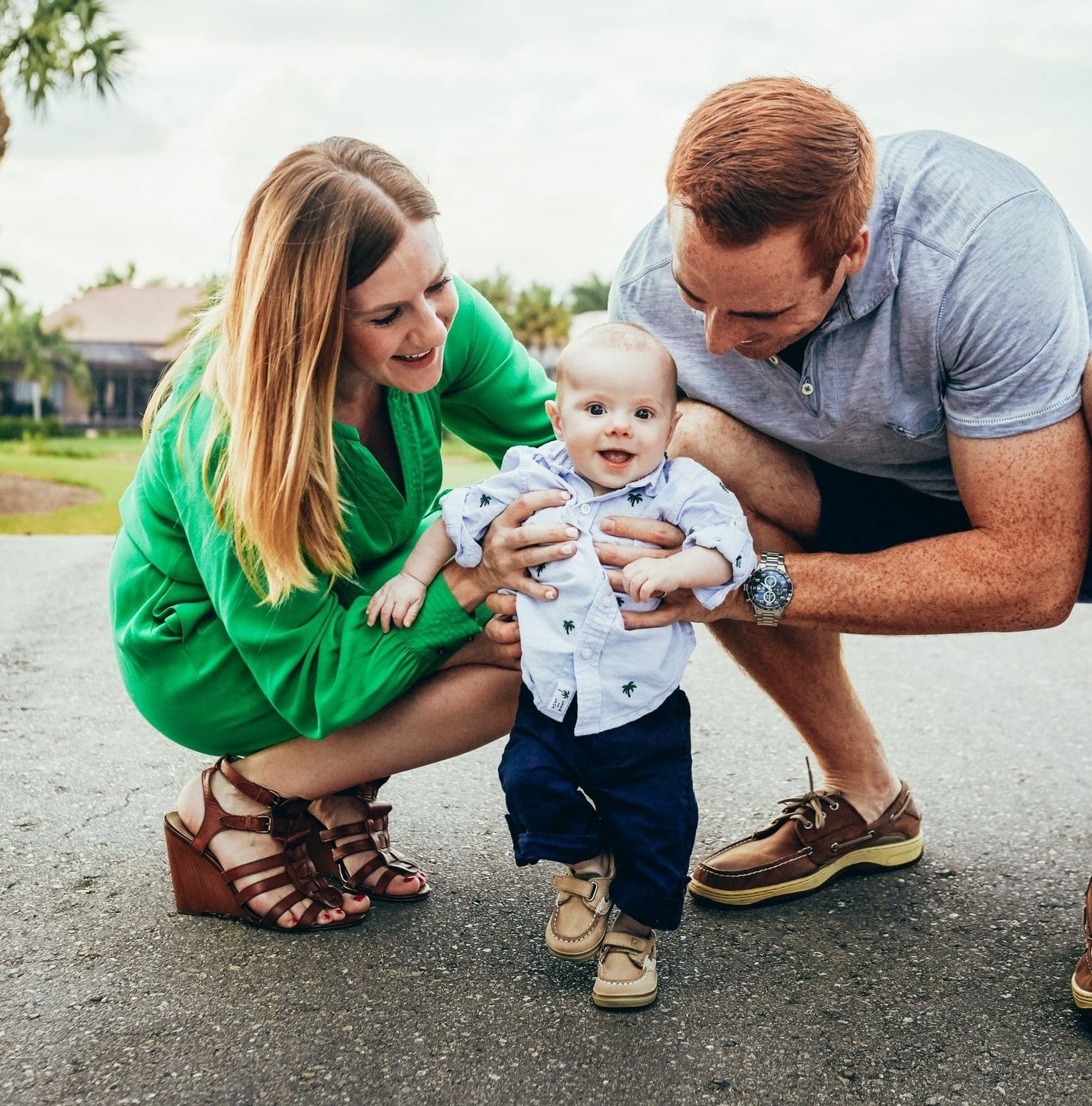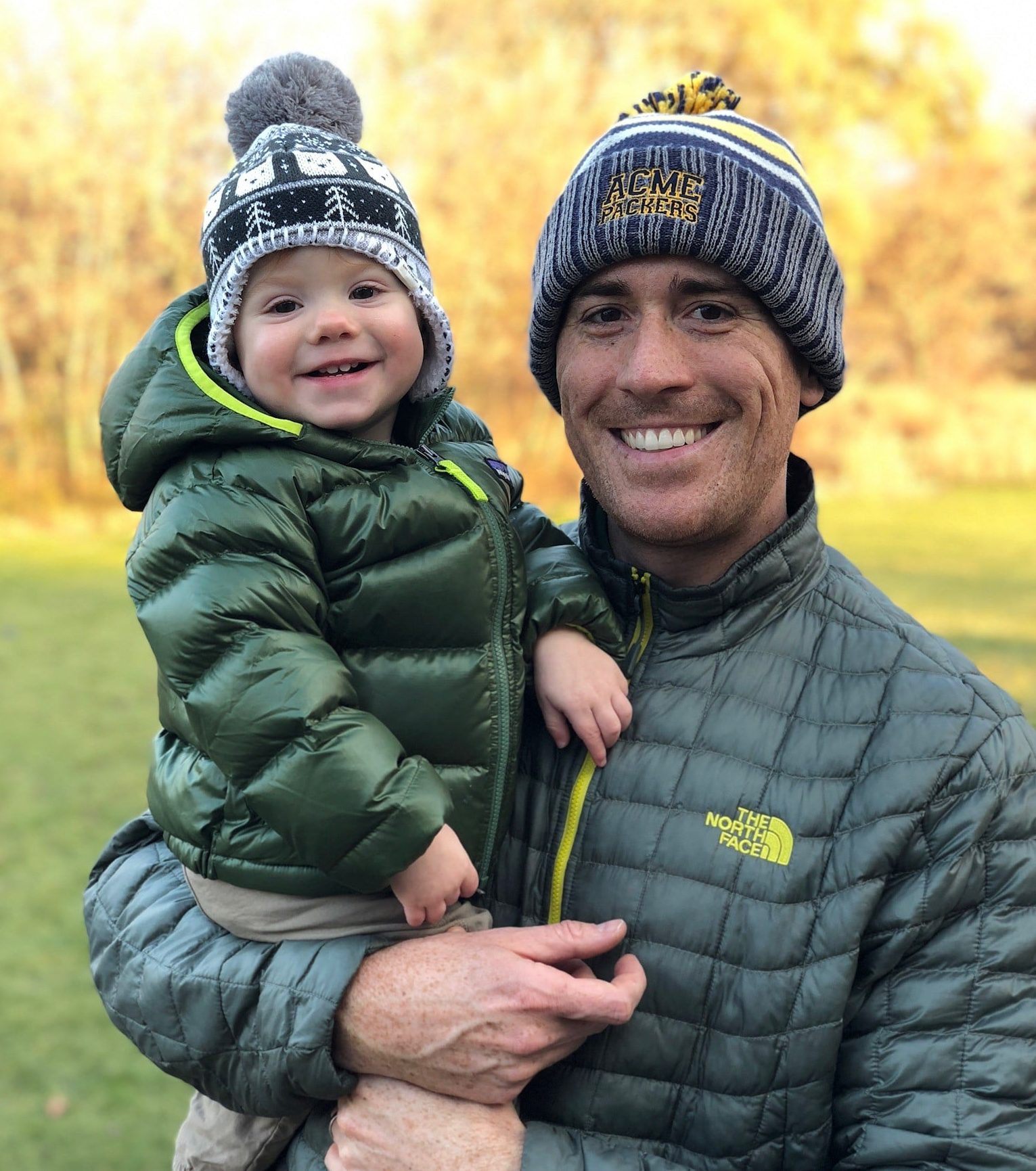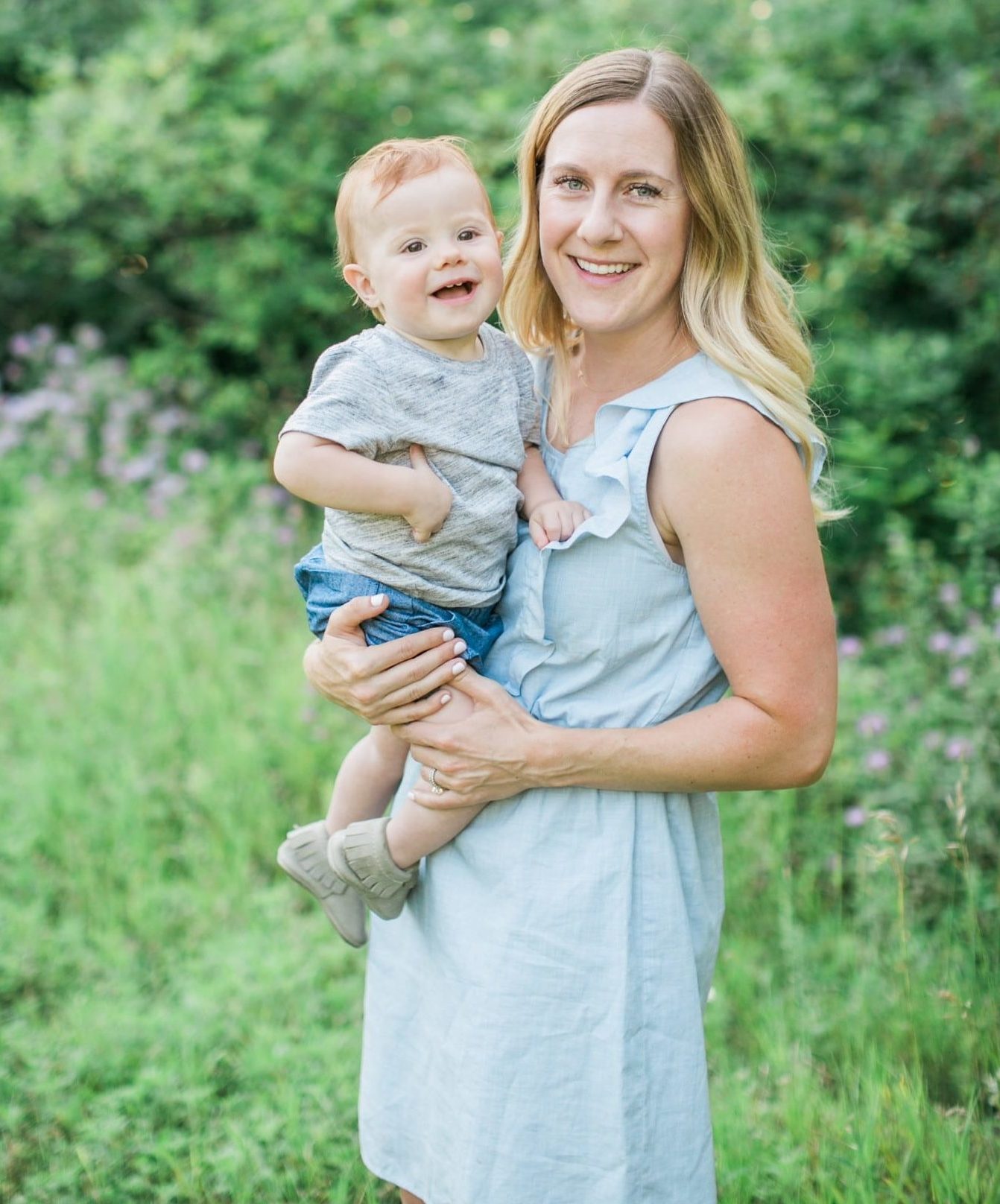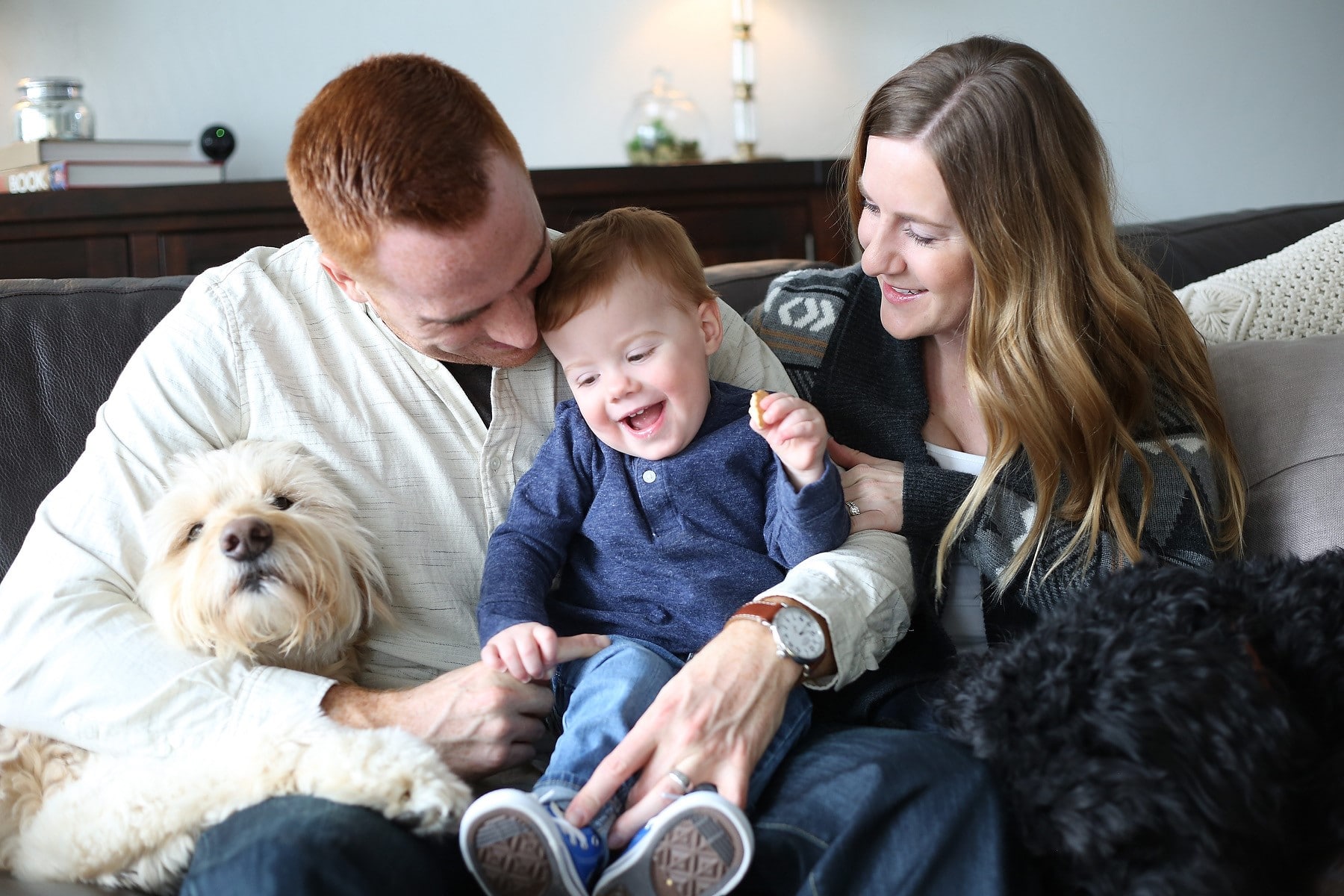Many people don’t learn how to perform CPR because they never think they’ll be in a situation where they will have to use it. But this Father’s Day, Luke Benrud is glad he did.
On August 27, 2016, Luke performed CPR on his wife five weeks after they’d had their first child. If it hadn’t been for Luke’s Red Cross training, he would now be raising his 19 month-old-son, Aiden, alone.
We had the privilege of speaking with Luke and his wife Andrea to learn more about their family, what happened that day and why it is important to have the knowledge, skills and confidence to act in an emergency. This is their story.

How long have you and your wife been together? How did you meet?
Luke: We first met in middle school. So we met when we were like 12. We went to high school together and then started dating one summer when we were both home from college. We went to different colleges, but both came home one summer and started dating. Then we went back off to college. We finished college, then I moved out to California for my job and then Andrea moved out there as well shortly after and got employed out there. We were out in Southern California for three years. That’s where we got engaged. Then we started talking about where we wanted to settle down and raise a family. I had a good opportunity for my career working with her dad and some of the businesses he had going on. Southern California is a very fun place to live when you just graduate college and can afford to live out there. But it’s not a very practical place to buy a home and raise a family and do those types of things that we wanted.
How old is your son now?
Andrea: He is 19 months old, so a year and a half.
What made you decide to take CPR training?
Luke: At one point in my career I worked in construction on a job site as a project manager. From a safety standpoint, we were required to have it done. I think that the first class I ever did was because of that. Then I just wanted to keep it renewed. Going through it the first time, some of the stories are shared with you and then it kind of helps you realize the importance of knowing it. So then I just have always kept up with it since then, every couple of years.

Can you tell me about the day that you needed to perform CPR on your wife?
Luke: It couldn’t have been a more normal day. It was a Saturday evening. We had run some errands. We got together with my family because my sister had recently bought a house, so we were helping them get settled into their new home. Andrea was feeling totally fine. [She] never had a complaint about anything that day. Then we eventually got home after running the errands and visiting with family in the evening. We were going to just make dinner. I left the room to go change Aiden’s diaper and came back, and she was just lying on the ground. I immediately could see that her face was really a bluish-purple color so I knew it was something serious. So I put Aiden in the chair and then went back. It’s hard to explain how I knew what I was doing or how I knew what to do. I was kind of just reacting. My subconscious just kind of kicked in and my adrenaline was going and everything. Luckily, I was able to remember the key things from CPR.
At first I thought, you’re not thinking that she would just randomly have a heart issue because she’s very healthy, she’s always done sports. She was competing in CrossFit competitively and that type of stuff. So you’re not thinking it was a health issue. So I thought she’d tripped and hit her head or something like that. That was the first thing I checked, her head, but it wasn’t bleeding or anything like that. I checked that she didn’t have a pulse and that she wasn’t breathing, so then I just started doing what I could remember from CPR. I knew where to find the spot. I could kind of remember the pace you needed to do it at. I remembered that you need to push harder than what you think you should push, or that you want to push, especially when it’s your wife. You don’t want to hurt her or anything, but I knew I had to push pretty hard.
I should back up though. After I set Aiden down, I pulled my phone out of my pocket and called 911, and put it on speaker, set it on the floor and started doing whatever I thought was the right thing to do with her. So I just started doing chest compressions right away. I was doing that for what ended up being seven minutes while I was talking to the 9-1-1 dispatcher. It ended up being about seven minutes that I was doing that until the first responders came and took over for me.
The first responders got there and they had the defibrillator. So it ended up taking the defibrillator to get her heart and rhythm back to normal, and her vitals came back. But even though her vitals came back, she was still unconscious, which isn’t unusual when people go into cardiac arrest. They don’t usually just shock them and then they jump up like you see in the movies. She was in the ICU in a drug-induced coma for three days.

What would you say to someone who was considering taking CPR training? Or someone who thought they didn’t need it?
Luke: I can understand somebody thinking that. I honestly was getting trained thinking that in case this ever comes in handy, it’s an important skill to have. But never in a million years did I think I would use it on a family member. So if someone would have told me that someday I would use this on my wife, I would have told them they were crazy. I mean I know it’s easy to say and it sounds cliché, but you just never know when you’re going to need a skill like that. And it’s a skill where if you need to use it, it’s a life or death matter that you know what to do. There’s no pressing pause to go and research the skill now to figure it out. Every second matters. It’s a training that you have to be proactive about if you want to know what to do. There’s no second chance. And that’s the most impactful thing I guess that I tell people is if you were put in a situation like I was put in, if I didn’t know what to do, and this whole story had a very different ending, I can’t imagine living with myself if I didn’t do the right thing, or if I didn’t know how to do CPR and she didn’t have treatment for seven minutes until the paramedics got there. It would have been a very different situation.
Andrea: You don’t have to be a rocket scientist to know how to do it. It’s simple. Now having a child, I think it’s important after this happened to me. I went and did an infant CPR class. Having a child, it just made sense. Kind of a peace of mind.
Luke: The other thing that I would say is, it is a really straightforward thing to learn. So I understand why people would maybe not go to a class and just watch a YouTube video or something. But you definitely learn more going to the class. When you’re put in this situation, you’re half in shock, your mind is blank. You don’t even really know what you’re doing. You’re just reacting. I don’t think that would be the same if it’s just a video that you watched online and you’ve never actually administered it to a person or did it to a dummy. I don’t think all the pieces would’ve have clicked if I hadn’t actually gone to the course. It gives you a sense for how much pressure you should be applying and where to exactly place your hands and that type of stuff.
When your wife woke up from her coma, what was your first thought?
Luke: I just felt relief that things were going to be okay.
Be Prepared
Be prepared for when the unexpected happens. Sign up for a CPR/AED and First Aid class today at redcross.org/takeaclass.
Download the free Red Cross First Aid App for instant access to expert advice on how to perform Hands-Only CPR and other lifesaving skills.

